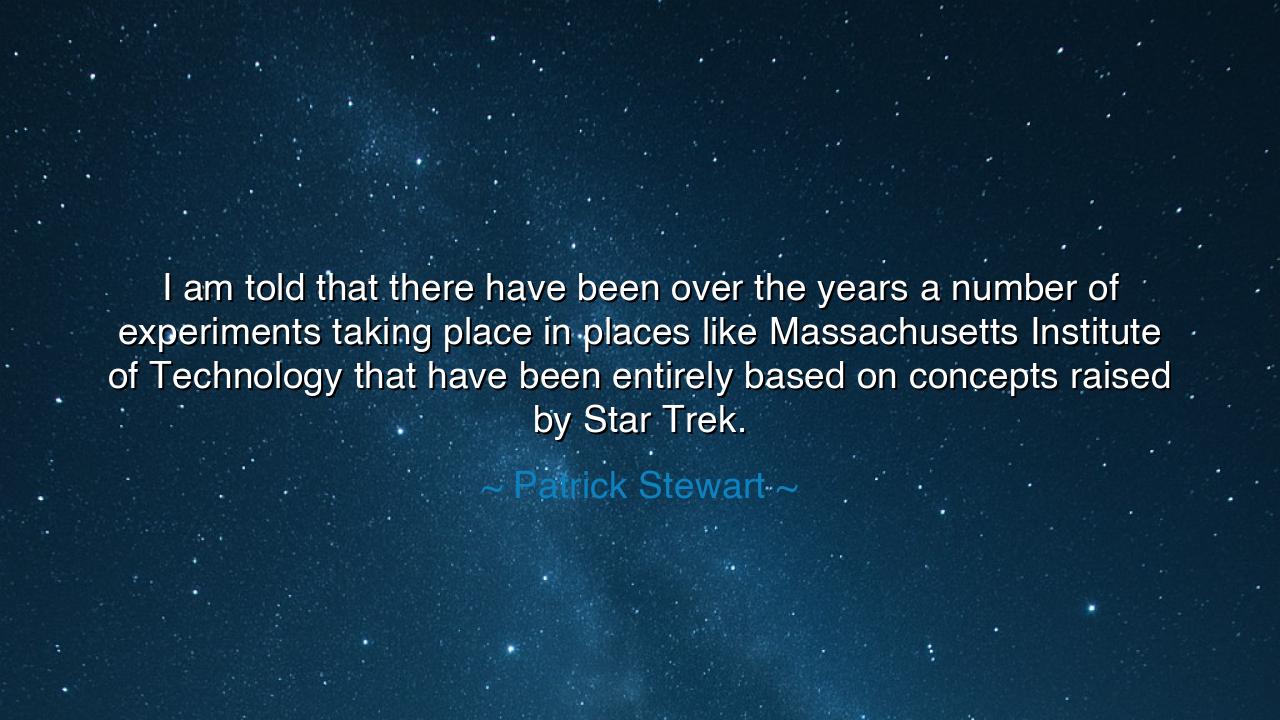
I am told that there have been over the years a number of
I am told that there have been over the years a number of experiments taking place in places like Massachusetts Institute of Technology that have been entirely based on concepts raised by Star Trek.






The words of Patrick Stewart, “I am told that there have been over the years a number of experiments taking place in places like Massachusetts Institute of Technology that have been entirely based on concepts raised by Star Trek,” resonate as a celebration of imagination as the mother of invention. Stewart speaks to the profound truth that ideas born in the realm of fiction can inspire real-world technology and scientific progress. Concepts that first existed as dreams—transporters, communicators, and replicators—become the seeds of experiments, prototypes, and eventual innovation, showing that the human mind, unshackled by current limitations, can illuminate the path to discovery.
The origin of this reflection lies in Stewart’s life as an actor, thinker, and cultural observer. As Captain Jean-Luc Picard in Star Trek: The Next Generation, he inhabited a universe of advanced technologies and ethical dilemmas, and he observed with awe how these fictional devices and ideas began to influence real-world laboratories and research initiatives. Stewart’s insight underscores that science fiction, far from mere entertainment, functions as a form of visionary pedagogy, inspiring engineers, scientists, and inventors to turn imaginative possibility into tangible reality.
History offers vivid parallels. Consider the submarine, a technology centuries in the making, which was inspired in part by the imaginative sketches and writings of authors like Jules Verne in Twenty Thousand Leagues Under the Sea. Verne’s visions, while fantastical, provided conceptual frameworks that guided inventors and engineers in the 19th and early 20th centuries, turning fiction into functional reality. Stewart’s observation reminds us that inspiration often begins in the imagination before taking root in laboratories, classrooms, or workshops.
Even in the modern era, the influence of Star Trek is undeniable. Early prototypes of tablet computers, voice-activated assistants, and even cellular phones bear the mark of devices imagined by Gene Roddenberry’s universe. Engineers and students at institutions like MIT have undertaken experiments and projects explicitly inspired by the Star Trek universe, proving that narrative can guide practical inquiry. Here, Stewart’s words illuminate the bridge between imagination and innovation, where creative storytelling catalyzes scientific pursuit.
The meaning of his statement is profound: creativity precedes creation. To envision new worlds is to prepare the soil for invention. Fiction serves as both inspiration and blueprint, offering models of what could be while challenging scientists to question what is. Stewart’s insight emphasizes that the human mind thrives on narrative; when we dare to dream boldly, we can inspire technologies that reshape society.
The lesson for future generations is timeless: cultivate imagination, for it is the wellspring of progress. Read widely, explore fantastical ideas, and consider the “impossible” as a provocation for inquiry. Recognize that innovation does not emerge solely from empirical observation, but from the interplay between vision and experimentation. Stewart reminds us that even entertainment—stories, art, and myth—can ignite practical, world-changing endeavors.
Practical action flows naturally. Support creative education that nurtures both scientific literacy and imaginative thinking. Encourage collaborations between storytellers and technologists, engineers and artists, visionaries and experimenters. Engage with speculative ideas, asking how they might inspire prototypes, experiments, or entirely new fields of inquiry. By blending inspiration with diligence, the imaginative becomes the practical.
Thus, let Patrick Stewart’s words endure as a beacon: concepts from fiction, like Star Trek, can inspire real scientific experiments and technological breakthroughs. May we honor both imagination and inquiry, knowing that the dreams of today are the discoveries of tomorrow. In embracing the visionary power of storytelling, humanity unlocks not only creativity but the tools to shape a future once thought possible only in the mind’s eye.






AAdministratorAdministrator
Welcome, honored guests. Please leave a comment, we will respond soon